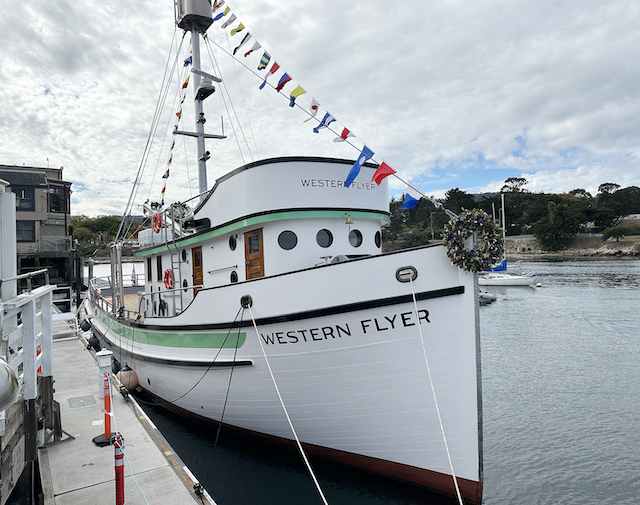The boat made famous by John Steinbeck, who used the Western Flyer 77-foot wooden purse seiner for multiple expeditions with his biologist friend Ed Ricketts, has found a new home in the Monterey Bay.
Built in Tacoma, Wash., in 1937 as a purse seiner to fish for sardines in the Monterey Bay, the boat went astray in a tangled history that included disappearing for a long spell and sinking twice over the last eight-plus decades. It now lives in Moss Landing as part of the newly formed Western Flyer Foundation.
“It’s inspirational, emotional and an exciting challenge,” said Paul Tate, the captain of the Western Flyer.
He steered the boat into the Monterey Harbor last month as part of a colorful homecoming celebration for the boat where a day of festivities unfolded.
“This is a dream I have alway had: to see this boat come again to life, from the pages of the books to arriving at Fisherman’s Wharf,” he said. “It’s really unbelievable.”
In March 1940, Steinbeck and Ricketts teamed up on a marine specimen-collecting expedition to the Gulf of California in Mexico aboard the Western Flyer. Their six-week voyage inspired the book, “Journals From the Sea of Cortez,” which was published in 1951.
Scores of Steinbeck points of interest dot the map in this region, including a house in Salinas where his family lived when he was born. The National Steinbeck Center opened in Salinas in 1998. The home of his sister, Esther, that once stood on East Lake Avenue in Watsonville, now serves as the centerpiece to the entrance to the Santa Cruz County Fairgrounds.
The all-day welcome party for the Western Flyer on Nov. 5 in Monterey included free admission to the Pacific Biological Laboratories, or Rickett’s lab, in Cannery Row, an historic walking tour, a boat parade and free tours of the Western Flyer.
“The boat will be based in Moss Landing and Moterey and eventually be used for students and scientists,” said Sherry Flumerfelt, CEO of the Western Flyer Foundation. “We’re excited to see the boat return to the purpose of its original journey by Steinbeck and Ricketts who both loved art, science and mythology.”
She described the project, which has been years in the making, as a mission to build connections.
A major restoration of the boat included new garnishes, such as three coins set in the base of the mast, two quarters from 1937 and 2023 and a Mexican peso from 1940. The deckhouse is the original one as are the fir floorboards.
Tate said the boat will split time between the Moss Landing and Monterey harbors. While ocean-going trips aboard the Western Flyer for the public are not on the menu, dockside tours will eventually open up.
The Western Flyer went through several owners and tasks over the years including fishing for perch, sole and cod in the waters off the Oregon coast and north to British Columbia. It was also used to catch king crab in the Aleutians, Alaska. Restoration costs stacked up to around $6 million.
“We’re still refining and doing final touches,” Flumerfelt said. “And we’re still fundraising; we are a nonprofit and we’re part of Monterey County Gives.”
Flumerfelt added that the public can see the Western Flyer in the Moss Landing Harbor from the deck of Woodwork Marine Market, 10932 Clam Way.
“It’s a great spot to enjoy a coffee or a beer and check out the boat,” Flumerfelt said.
The boat returned to fishing for decades, sank and was in severe disrepair when marine geologist John Gregg purchased it in 2015.
Inspired by childhood memories of the book, Gregg launched the Western Flyer Foundation to restore the iconic boat and continue Steinbeck and Ricketts’s legacy of research and education.














